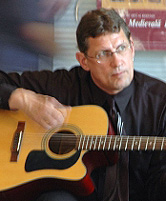David W. Landrum
is professor of Humanities at Cornerstone University, Grand Rapids, Michigan. He has published poetry and short stories in many magazines and journals, including Web Del Sol, The Barefoot Muse, Driftwood Review, Small Brushes, and many others.
He is currently at work on a series of poems about 16th Century English poet Robert Herrick.
< Back to Poetry Contents>
|
Weight
after Jane Hirshfield
a child in our arms, warm,
settled in the sureness gravity
has given it, its weight against our weight;
the weight of tools—boxes of nails,
a hammer’s heft, a plane,
unwieldy levels, steel-burdened
brace and bit;
bags of bird seed, cat litter,
concrete; sacks of rice or flour
put away; melons,
smooth as they are ponderous;
buckets of water from the well
at my grandparents’ home; the cat
who did not like me to pick her up
and shook herself each time I did;
glasses of water, goblets filled with wine,
thick beer mugs rooted to the table-wood;
the long-sought harvest-fruit:
tomatoes in the peck, apples,
peaches in baskets, bags
of beans and
grain; ungainly pumpkins;
the corpse of a raccoon I buried
for my neighbor near her fence;
the weight of books, a hymnal held in church,
a bible, dictionary, novel thick with story;
concrete building blocks, wheelbarrows full
of soil or stone;
things in our hands, our arms.
Ely Cathedral
Up on the parapets the wind is strong,
sweeping from marshy grasses stretching out
over the swamps and moors
where in the middle ages eel-fishery transformed
a village to a rich city. Cold, damp,
they blow. We hang on to the iron rails
and see the clouds rush. Below,
you do not reckon nature in zones
of city, road, bus station. Wetland and canal;
pond and moor-grass define the scope
of our developments. We are contained
in nature, and will never push it by.
Bryhtnoth is buried here, the king who fought
and died at Maldon (the Vikings took his head
but not his golden sword). He did not flee
like Wiglaf. Etheldrada, called a saint,
came from the pagan cold into the warmth
of Christ's embrace. Though married twice,
she would not share her heat with any man
and founded a convent and a monastery
out on the island caught between the fens.
Henry VIII threw out the monks and Cromwell
stabled his horses there. The Victorians
put in new stained glass windows,
and frescoes in the style of the Pre-Raphaelites:
chaste, prim angels, big-eyed women saints,
the gold-leaf bright beside the ancient stone
of virgin abbesses and warrior kings laid
out in their crypts a thousand years before.
Atop the church I imagine the view of God
or at least what local angels see:
the city spread below, people
at the business of food and work,
sleeping and breeding, feeling the damp wind
of spring and fall, winter's misery,
the brief, cool interlude of summer.
If those angels could speak
they would tell me on authority
that those we see below,
like the eels that swim in the fens,
are creatures in God’s keeping,
though poised on the edge of a bilateral fate:
heaven or hell—or they might say what Bede
said to the new-converted thanes:
if you drank all night and listened to a bard,
and in the midst of his song
a bird flew quickly through your mead hall:
this was the fleeting bird of life against
long hours in the hall spent pleasantly;
eternity opposed to earthly days.
In the grey-over-blue of sky and the marshy ground,
in the vertigo up on this tower,
things grow cloudier but clear.
Over the hills and down the long horizons,
misty glimpses come of distant towns and villages.
Grandparents
They moved as if they were already ghosts,
quiet, chastened. On a cast-iron stove they fried
fatback, greasy potatoes, pinto beans.
One day when she was churning milk in the well house,
I asked Grandmother, would she stop and read to me?
"I never learned to read," she said, and I felt
a pang for her, thinking she had to work
in the cotton fields and did not go to school.
Later I heard her tell my mom and dad
she'd read about some thing.
Ash from their wood-stove would fill
my nostrils when our Buick pulled
into their pitted yard (always at night
after an all-day drive). Their dog, named Ring,
who lived under the house, would jump and bark.
And they would rise up from the porch
and shamble out to our car, mouths pressed tight,
weary with life and troubles, as if we
were one more weary thing to be endured.
|

